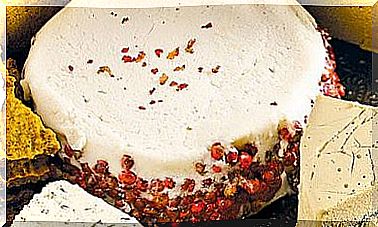Thinking With Your Stomach
Surely you have ever made an important decision based on intuition, or have felt butterflies in your stomach before an interview. This is how the dialogue that exists between the brain, the intestine and the intestinal bacteria is expressed. But there is much more, your relationship is key to maintaining a good mood and mental health.

Extended, the digestive system measures the size of a basketball court and is packed with thousands of tiny sensors that encode a vast amount of information. And it is that brain and intestine are connected through the nervous system and information is transferred in both directions.
More than 90 percent of the sensory information that the intestines collect goes unnoticed. For most of us it is easy to ignore daily sensations, but thanks to the brain that exists in the gut, all of them are monitored and well recorded.
The brain does not forget the sensations that are generated in the guts and that are stored in the large databases of the brain, so that they can be used later, when we have to make a decision. I mean, literally
What we feel in our guts could affect not only decision-making about what we eat or drink, but also the people we hang out with and how we evaluate important information, whether as workers, members of a court or leaders.
The intestines are the second brain
The intestine, from the esophagus to the rectum, is surrounded by a very important network of fifty million neurons known as the enteric nervous system (ENS).
- Second brain. The ENS functions as a true “second brain”, which not only takes care of everyday matters that have to do with digestion.
- Central alert. When we sense a threat or feel scared or angry, the emotional center of the brain alerts the second brain, the ENS, to deviate from its daily routine and intervene. Once the alert is over, the digestive system returns to its control of digestion, past the emotion.
Anxiety can be born in the guts
When emotions act in the theater of the intestines, a large cast of specialized cells is at work. The plots revolve around what happened during the day, both positive and negative anecdotes.
Many times we feel in our stomach the worries for the children; the irritation of when the guy in the next lane crosses us on the freeway; anxiety about being late for an appointment; the fear of being fired; economic problems, etc.
The intestinal cells of a person with chronic anger and anxiety, following a script that comes from childhood, can act out dark plots day after day.
Over time, many of these people’s gut cells conform to the stage direction: the nerve connections in the ENS change, the gut sensors become more sensitive, the serotonin-producing machinery in the gut increases its speed, and even gut microbes become more aggressive.
Change flora to improve mood
We understand a lot about these gut reactions associated with negative emotions, such as anger, grief, and fear, but little is yet known about gut responses to positive emotions such as love, attachment, and happiness.
Changing the script of the play seems like a good way to deal with emotions and some health conditions. If the theater program of the brain were exchanged for more positive stories, a more promising future would be achieved with the aim of altering the intestinal reactions and, therefore, reversing the cellular changes in the intestine.
Studies are currently being carried out to determine whether changes in the intestinal flora are associated with positive interventions. As in meditation, it is studied what type of bacteria are associated with states that are more favorable to mental health.
When my research group at the University of California, Los Angeles (UCLA), led by Kirsten Tillisch, finalized our own study on healthy individuals, we were able to confirm the results of previously published studies in animals on how the interaction between flora Gut and brain can affect our emotions, social relationships or even our ability to make decisions. And when these connections between the mind and the gut are disrupted, they can even increase the risk of developing chronic brain diseases.
Autism, depression, and poor gut flora
The intestinal flora has a relevant role in health. In the last decade it has been documented how the frequency of cases of the autism spectrum, autoimmune diseases, Alzheimer’s, Parkinson’s and metabolic disorders has increased. The similarities in the development of these new epidemics suggest a common underlying mechanism related to a change in gut flora over the past fifty years.
Lifestyle changes, diet, and the widespread use of antibiotics are possible causes. The diversity and abundance of intestinal microorganisms varies throughout life and in each individual. It is low for three years of life, while a stable microbiome is established, peaks during adulthood, and declines as we age.
The first period of low diversity coincides with the window of vulnerability to neurodevelopmental disorders, such as autism and anxiety, while the last stage of low diversity coincides with the development of neurodegenerative disorders, such as Parkinson’s or Alzheimer’s. Thus, low diversity can be a risk factor.
Nourish bacteria to improve mental health
Maintaining the diversity and abundance of good bacteria is key to a good gut-brain “dialogue” and living healthy. These habits help nourish the good bacteria:
- Take fermented foods because they contain probiotics, live microorganisms, such as kimchi, sauerkraut, kombucha, yogurt, or miso.
- Take fresh vegetables and fruit, very rich in fiber, if it is organically grown better, because it does not contain toxic chemicals.
- Eating less helps to limit calories – adapting them to the real needs of the body – and that is more optimal for the digestive system.
- Fasting to starve the intestinal flora, cleaning the intestine and eliminating toxins.
- Eat without stress, without being angry or sad. Remember that emotions have profound effects on the digestive system and its bacterial environment. A negative emotional state will unbalance: it can permeabilize the digestive organs, activate the immune system or release stress hormones.
- Enjoy in the company of meals. The resulting feeling of affinity and well-being is very likely to affect digestion and influence the response of the intestinal flora to what we eat.









